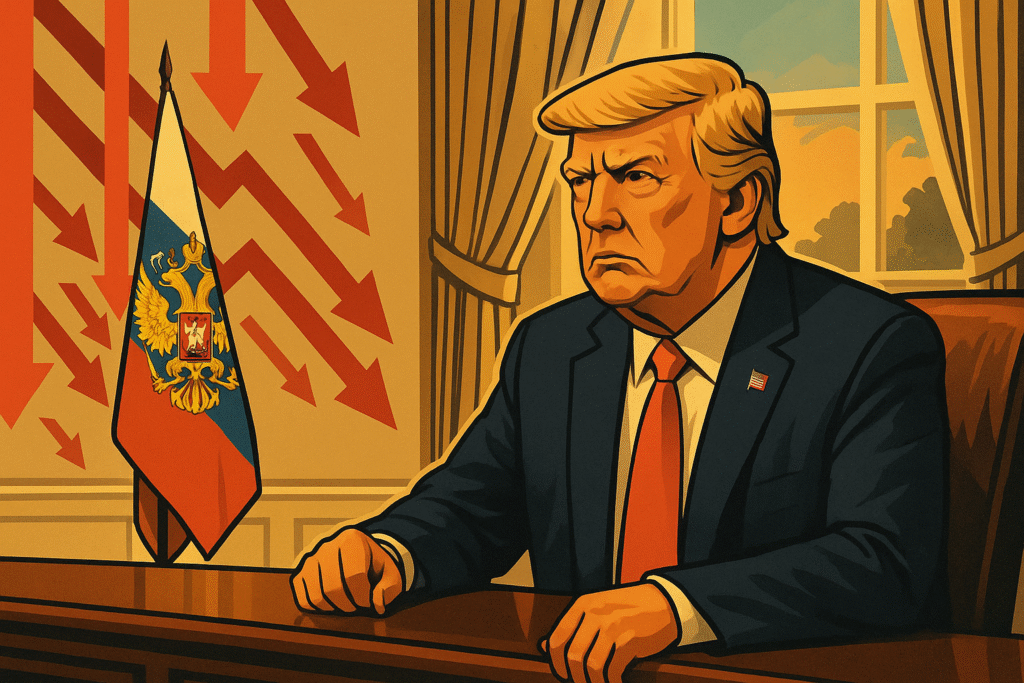President Donald Trump has issued a stark ultimatum to Russian President Vladimir Putin: reach a peace agreement with Ukraine within 50 days or face sweeping economic consequences. The warning, delivered during remarks in the Oval Office on July 14, signals a new phase in U.S. efforts to pressure Moscow into ending the war.
Trump announced that if a deal is not reached soon, his administration will impose “very severe tariffs” — potentially as high as 100% secondary tariffs — on Russia and countries that continue to trade with it, particularly those buying Russian energy. These tariffs would target nations indirectly fueling Russia’s war effort and would serve as an alternative or complement to a bipartisan sanctions bill currently under negotiation in Congress.
Parallel Efforts in Congress
At the same time, a bipartisan group of senators, led by Sen. Lindsey Graham (R-S.C.) and Sen. Richard Blumenthal (D-Conn.), has been advancing legislation that would impose 500% tariffs on any country purchasing or selling Russian oil, gas, or petroleum. The bill has gained significant momentum, with 85 Senate supporters and backing from both House and Senate Republican leadership.
However, Trump’s announcement has temporarily stalled momentum on the bill. Senate Majority Leader John Thune (R-S.D.) said that the chamber may delay action to give the president time to apply his strategy independently. “It sounds like right now the president is going to attempt to do some of this on his own,” Thune noted.
Trump Signals Openness to Legislation — On His Terms
While Trump has expressed skepticism about the necessity of the sanctions bill, he has not ruled it out. He praised the legislation’s design, calling it “a pretty good piece of legislation,” but emphasized that any sanctions mechanism must allow flexibility for presidential implementation.
The bill was adjusted to offer Trump greater discretion, including the ability to grant 180-day waivers on a case-by-case basis if deemed necessary for national security. Sen. Graham and Sen. Blumenthal issued a joint statement in support of the revised bill, describing it as “legally and politically rock solid.”
Impact on Global Energy Trade
The proposed sanctions and tariffs could have a major impact on countries like China, India, Turkey, and Brazil, all of which continue to import Russian energy. U.S. imports from Russia have already fallen to around $3 billion annually, but the administration and Congress are increasingly focused on curbing indirect funding sources that sustain Russia’s war efforts.
House Foreign Affairs Chairman Brian Mast (R-Fla.) said the time for secondary sanctions had arrived, noting that countries still trading with Russia should not be surprised. “The biggest cash cow that is allowing Russia to continue to prosecute this war is the oil and the gas sales,” he stated.
Democratic Support for Tough Measures
Prominent Democrats have expressed cautious optimism that bipartisan sanctions could still move forward with Trump’s support. Sen. Elizabeth Warren (D-Mass.), a co-sponsor of the bill, emphasized the importance of maintaining congressional oversight while giving the president room to conduct diplomacy. “There’s a needle to thread,” she said.
Sen. John Fetterman (D-Pa.) offered full support for the strongest sanctions possible, praising Trump’s recent remarks as a potential turning point. “It’s truly heartbreaking and appalling the way Russia is hitting Ukraine with drones and killing civilians,” he said. “The things the president has said have given me the first hope since his election that we could actually address the situation.”
A Strategic Move
Trump’s warning to Putin — coupled with a new initiative to supply Ukraine with U.S.-made weapons financed by European allies — represents a dual-track strategy: pressure Russia through both economic and military means while maintaining negotiation leverage. Whether the threat will shift Putin’s calculus remains uncertain, but the U.S. has now clearly signaled that patience is running out — and consequences are near.



